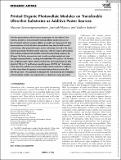Printed Organic Photovoltaic Modules on Transferable Ultra‐thin Substrates as Additive Power Sources
Author(s)
Saravanapavanantham, Mayuran; Mwaura, Jeremiah; Bulović, Vladimir
DownloadPublished version (1.473Mb)
Publisher with Creative Commons License
Publisher with Creative Commons License
Creative Commons Attribution
Terms of use
Metadata
Show full item recordAbstract
Thin-film photovoltaics with functional components on the order of a few microns, present an avenue toward realizing additive power onto any surface of interest without excessive addition in weight and topography. To date, demonstrations of such ultra-thin photovoltaics have been limited to small-scale devices, often prepared on glass carrier substrates with only a few layers solution-processed. We demonstrate large-area, ultra-thin organic photovoltaic (PV) modules produced with scalable solution-based printing processes for all layers. We further demonstrate their transfer onto light-weight and high-strength composite fabrics, resulting in durable fabric-PV systems ∼50 microns thin, weighing under 1 gram over the module area (corresponding to an area density of 105 g m-2 ), and having a specific power of 370 W kg-1 . Integration of the ultra-thin modules onto composite fabrics lends mechanical resilience to allow these fabric-PV systems to maintain their performance even after 500 roll-up cycles. This approach to decouple the manufacturing and integration of photovoltaics enables new opportunities in ubiquitous energy generation.
Date issued
2023-01Department
Massachusetts Institute of Technology. Research Laboratory of Electronics; Massachusetts Institute of Technology. Department of Electrical Engineering and Computer ScienceJournal
Small Methods
Publisher
Wiley
Citation
Saravanapavanantham, Mayuran, Mwaura, Jeremiah and Bulović, Vladimir. 2023. "Printed Organic Photovoltaic Modules on Transferable Ultra‐thin Substrates as Additive Power Sources." Small Methods, 7 (1).
Version: Final published version